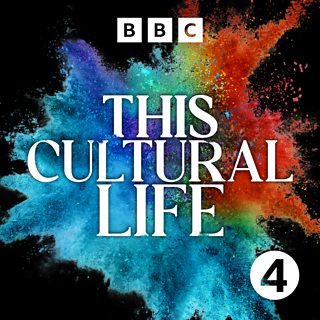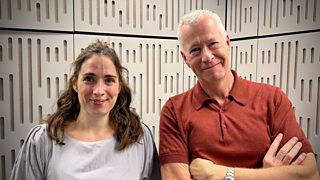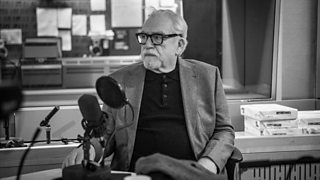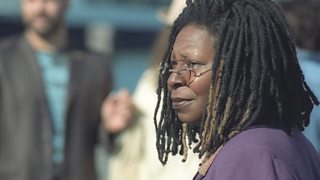Lucy Prebble: Nine things we learned from her This Cultural Life Interview
Lucy Prebble is one of Britain’s most celebrated young writers. She got her big break as a playwright with 2009’s Enron, a comedy about the Enron accounting scandal. Since then, she’s gone from success to success, with award-winning plays (The Effect, A Very Expensive Poison) and TV shows, including Secret Diary of a Call Girl, I Hate Suzie, and the Emmy-winning mammoth hit Succession.
On this episode of This Cultural Life, Prebble talks interviewer John Wilson through the highs and lows of her career, including why she kept her writing a secret, flopping on Broadway, and finding her home in Succession. Here are nine things we learned.

1. Lucy didn’t show anyone her writing until she was at university
Prebble has always loved writing, but she didn’t like to admit it. “I never showed anybody a piece of my writing until I was at university,” she says. “But before that there were a lot of shoe boxes under the bed – diaries, short stories, bad poetry, the usual sort of thing. There was also what you’d now call fanfiction – versions of TV shows that I liked as a kid that I started trying to write versions of.” She was a huge fan of American TV, and would record, on cassette tape, audio of shows like The Golden Girls or Star Trek. “I would take that to bed, plug it in next to me, and listen to it as I went to sleep. I think there was something in the shape and structure and rhythms, particularly of sitcoms, that I found really comforting.”
Reading early drafts by really amazing writers was actually more inspiring than seeing its final form, because you start to feel like, ‘I could imagine myself doing this...’Lucy Prebble
2. She learned among the greats
Prebble wrote her first play for the National Student Drama Festival (“like a tiny version of the Edinburgh Festival for students”). She calls the result “a mess”, but it helped her decide she wanted to be a writer, so she soon applied for a job at the National Theatre, becoming “assistant to an assistant” to director Sir Nicholas Hytner. “It felt like suddenly being on the bridge of the Starship Enterprise,” she says. “You’re a very lowly ensign, but you could see what was going on.” It gave her access to a world of brilliant creatives. She remembers picking up copies of early drafts by big writers. “I would quietly read those,” she says. “I shouldn’t have done that, but I did. Reading early drafts by really amazing writers was actually more inspiring than seeing its final form, because you start to feel like, ‘I could imagine myself doing this, doing something that’s not good yet.’”
3. She has mixed feelings on awards
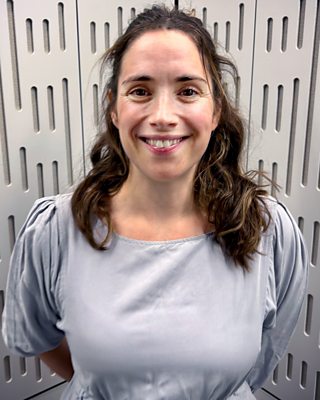
Her first play, The Sugar Syndrome, was staged at The Royal Court in 2003, while Prebble was still working at the National. It won her several awards. She has conflicting views on awards. “Awards are nice,” she says, sighing. However... “I think they’re really useful for getting through the door, but also I’ve been in situations where I’ve seen how awards panels work. Sometimes it’s a bunch of people who go, ‘We’ve been here for four hours, we want to go home, let’s give it to so-and-so’. I’m not being disparaging about any of the awards [I was given]. I’m incredibly grateful. But I think it’s also important to point out that they’re complex things.”
4. Billy Bragg is a big inspiration
Prebble chooses Billy Bragg as one of her cultural inspirations, specifically his song The Great Leap Forward. “I remember very clearly the first time I heard it,” she says. “My brother came back from the Reading Festival, when I was in my early teens or a bit younger. He brought back a cassette with him of the greatest hits of the Reading Festival that year.” She heard Bragg and was instantly moved. “I was so affected by it on a deep level. Partly his voice. There’s nothing quite like the authenticity of a British man who knows he can’t really sing but has something to tell you. And the hope of it.” She relates to the way Bragg writes. “The lyrics are not trying to be clever. They’re just very clear, which is how I often write, I think, now.”
5. She’s glad she was a huge flop on Broadway
When Prebble wrote Enron in 2009, it was a massive hit in the West End, getting rave reviews and awards. Then it went to New York. “It was a huge flop! It was a disaster,” says Prebble. The play lost millions. “It was an amazing experience of realising the same show is genuinely good in one context and bad in another.” She says a story about the financial crisis, attacking an American kind of capitalism, was, in retrospect, unlikely to find an audience on Broadway. “It didn’t work. They didn’t like it. It wasn’t like, ‘What fools they are not to get it’… As an artist, that’s a really fascinating experience.” If a positive came from it, it was that it taught her about being a leader in adversity. “I learned what it’s like to lead a bunch of people who suddenly realise they don’t have jobs.”
6. She only writes things that frighten her
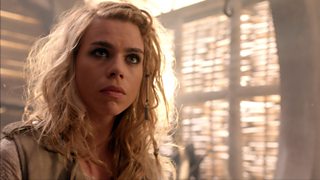
Prebble has a long-standing working relationship with Billie Piper, who has appeared in several of her plays and took the lead in Secret Diary of a Call Girl. They had their biggest critical success with I Hate Suzie, about a TV star whose life and career are imploding. Together they’ve created many transgressive, complicated women. Asked why she’s drawn to that theme, Prebble says, “I know that that’s interesting, so there might be a part of me that’s just keen to be interesting. It’s maybe not that admirable, but it’s true as a writer. But there’s also something else deeper.” She says as a child she often read stories of serial killers and has always been fascinated by behaviour that’s hard to explain. “I was always drawn to the things that felt inexplicable or dark or problematic. I don’t write about anything that doesn’t frighten me a little bit.”
7. She thought Succession would be just another job
Undoubtedly the biggest hit of Prebble’s career is Succession, the HBO show about a fractured media dynasty. She had no idea it would be any kind of success. “I was approached, I think, because of Enron,” she says. “At the time, we didn’t think it was really a big deal. We were in a very shabby in office in London.” She even thought it represented a possible collapse of her career. “Rather ignorantly and arrogantly, I think I was hoping [before this] that I would be able to create my own show. I was short of work at the time. I was struggling and a bit worried… I went into the room thinking, ‘Oh I guess this is it for me. This is the beginning of the slide down.’ It goes to show how idiotic you can be. Because it was huge for me.”

Who really inspired TV's Succession?
Writer Lucy Prebble talks to John Wilson on ���˿��� Radio 4's This Cultural Life.
8. The Trumps were an inspiration on Succession
The Trumps themselves were unavoidable for most of the time we were making this show... There’s as much in that as there is in anyone else.Lucy Prebble
When Wilson asks whether Succession was explicitly based on Rupert Murdoch and his media empire, Prebble answers carefully. “There are a huge number of corporate family dynasties we looked at,” she says. “That’s honestly true. We looked a lot at the Redstones, who are fascinating.” And they couldn’t ignore the most famous family in America at the time. “The Trumps themselves were unavoidable for most of the time we were making this show. And when you think about the father/children dynamics of that, there’s as much in that as there is in anyone else.”
9. She can’t imagine writing anything ever again
Prebble tells Wilson that being part of a writers’ room on Succession changed her. “I write now with a much greater sense of openness,” she says. “I’ll show writing to people earlier. I still feel vulnerable, of course, but I feel less wounded by criticism and doubt. I now really do experience it, if you show it to the right people, as a sort of love. Like, ‘I would love this to be better and I’d love to help you and here are some thoughts I have.’ That’s all come from just the safety and support of the Succession writers’ room.” She’s not sure what her next project will be, and that’s OK. “I’m in the phase now of I can’t imagine how I’ll ever write anything ever again… The thing is that as you get older you get used to that feeling and you remember it from last time. Something will come. It always does.”
More from ���˿��� Radio 4
-
![]()
This Cultural Life: Lucy Prebble
Listen to the full interview, where the writer talks about her creative inspirations.
-
![]()
Brian Cox: Nine things we learned from his This Cultural Life interview
The master of stage and screen sits down with John Wilson.
-
![]()
Whoopi Goldberg: Nine things we learned from her This Cultural Life interview
The actress on her unusual education, Steven Spielberg and why she regrets nothing.
-
![]()
Aaron Sorkin: Nine things we learned from his This Cultural Life interview
The mega-successful screenwriter talks about his life and inspirations.
